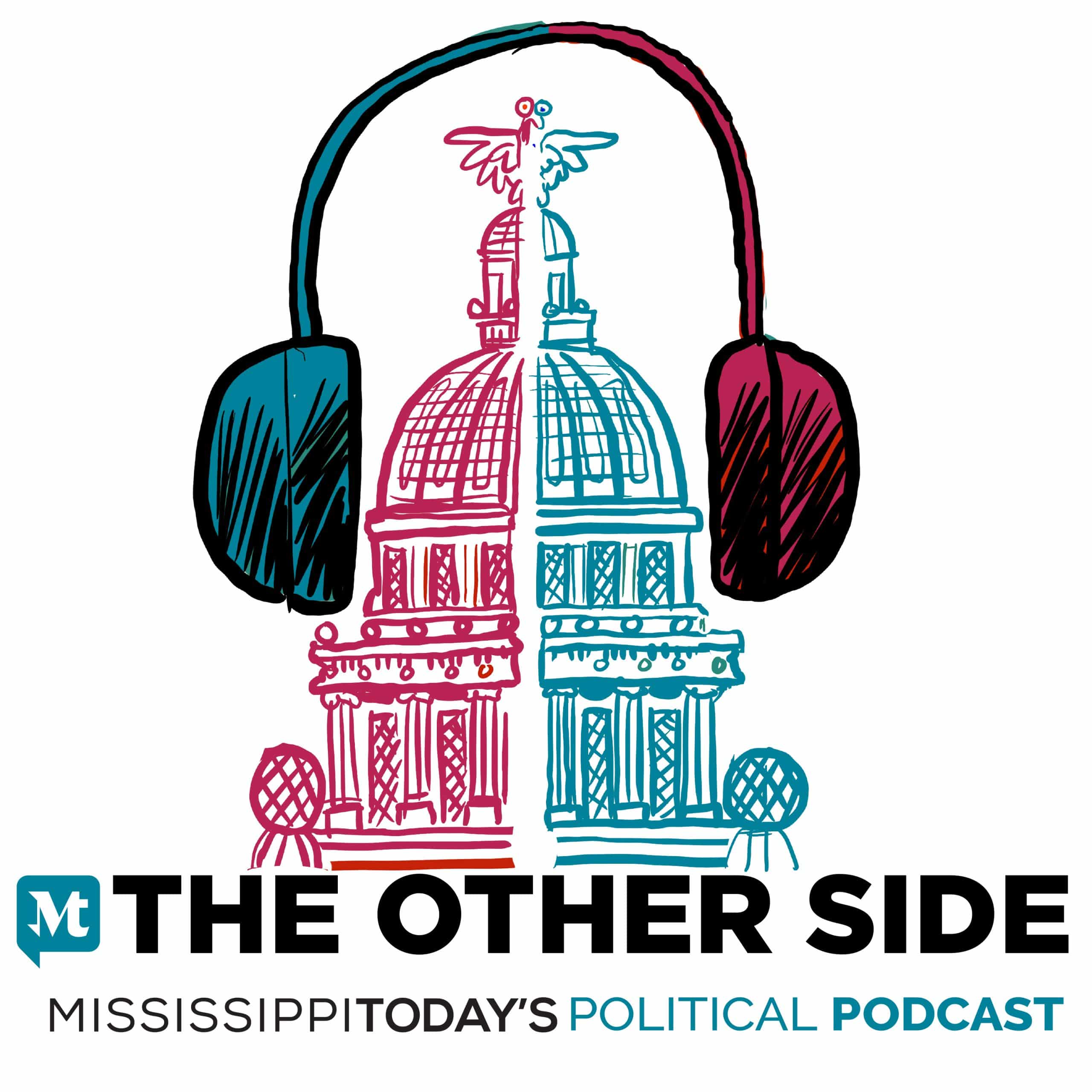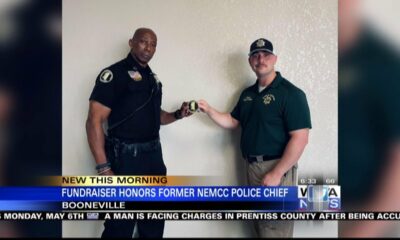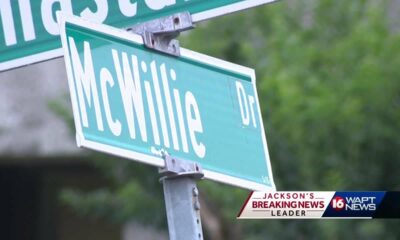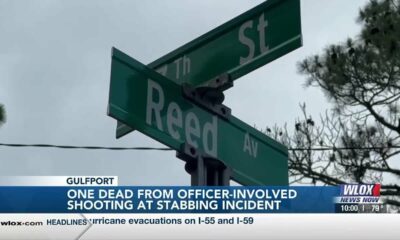Mississippi Today
Doctors plead with Senate to ‘do right’ and expand Medicaid
Several dozen doctors and health care leaders gathered at the Capitol Thursday to advocate for Medicaid expansion and call on Senate leaders – who have remained quiet on the House expansion bill that sits in their chamber – to close the state's health care coverage gap.
“I'm calling on the Senate to do right and to come up with a mechanism by which these people can have coverage,” Dr. Randy Easterling, former president of the Mississippi State Medical Association, said.
Easterling recounted the story of one working Mississippian named Jimmy who delayed seeking treatment and was diagnosed with multiple myeloma, a type of cancer. He is now on hospice and “probably has two to three weeks to live,” Easterling said.
Easterling's relative, an insured Tennessean, was diagnosed with the same condition as Jimmy. He received state of the art care in Nashville for his condition, which is treatable in most cases.
“I wish I could tell you that my story about Jimmy was an exception, but it's not,” Easterling said. “Everybody behind me can tell their own stories about the hundreds and hundreds of people that we've seen over our practice time that this has happened to … What makes my relative more deserving than Jimmy? We need to do better.”
Since the Senate let its own Medicaid bill — which was a “dummy” with no details — die, the House measure is the only expansion bill still alive this session. The House bill would increase Medicaid eligibility to Mississippians making up to 138% of the federal poverty level, about $20,000 annually for an individual. The bill, authored by Missy McGee, R-Hattiesburg, and Speaker Jason White, R-West, contains a work requirement for enrollees, but states that the expansion would go into effect even if the federal government does not approve the work requirement.
The Senate is expected to scratch the House's plan and replace it with its own proposal, a draft of which was leaked to Mississippi Today on Wednesday.
It would expand Medicaid only to working Mississippians making up to 99% of the federal poverty level, about $15,000 annually for an individual. The plan, which Medicaid Chair Kevin Blackwell, R-Southaven, has referred to as “expansion light,” would be entirely contingent on a work requirement being approved by the federal Centers for Medicare and Medicaid Services.
That's unlikely to happen under the Biden administration, which has rescinded work requirements previously approved for other states during the Trump administration and has not approved new ones. If the federal government denies the waiver, Mississippi would have to wait until a new administration took office, or sue the Biden administration. Georgia remains in litigation with the federal government over the work requirement issue, and has suffered low enrollment and missed out on millions in federal funds by not fully expanding coverage.
The Senate proposal has not been released to the public yet. Blackwell declined to comment on the substance of the plan, but stressed to Mississippi Today that he and Senate leaders are still tweaking parts of the legislation.
The Senate has until April 2 to pass the bill through Blackwell's Medicaid committee and until April 10 to bring it to a floor vote.

It's estimated that traditional Medicaid expansion would insure roughly 123,000 uninsured Mississippians. Currently, a Mississippian must have children and be making less than 28% of the federal poverty level to qualify for Medicaid coverage. For a family of two, such as a single mother and her child, 28% of the federal poverty level would be about $5,700 a year.
Tens of thousands of working Mississippians fall into the “coverage gap,” making more than 28% of the federal poverty level, but not enough to receive subsidies that would make private health insurance affordable.
In addition to insuring more Mississippians, expansion would also reduce the risk of rural hospital closure by 62%, according to a report by The Chartis Center for Rural Health.
Right now, Mississippi hospitals lose hundreds of millions of dollars a year in uncompensated care costs, or money spent treating uninsured patients. That directly impacts the financial health of hospitals, with one report putting almost half of Mississippi's rural hospitals at risk of closure.
“It's a tremendous burden on the health system,” said Dr. Claude Brunson, an anesthesiologist and the association's executive director. “The whole system depends on us being able to take care of people, and we fund that through people on insurance. And when you go out to the rural areas of our state, there are a lot of people with no insurance but they need care. And they could have insurance, and that would help stabilize those hospitals there, those practices there, so that we can keep them open. If we can keep the hospitals open, we can actually see those patients in their hometowns, in their communities, and that'll give us the ability to improve the health of Mississippi.”
This article first appeared on Mississippi Today and is republished here under a Creative Commons license.
Mississippi Today
On this day in 1983


May 6, 1983

A federal judge sentenced Raymond Bledsoe to life for beating Black jazz saxophonist Steven Harvey to death in a Kansas City park because of his race.
A Missouri jury had acquitted Bledsoe of murder, and afterward, he reportedly bragged to his girlfriend about killing a “n—–” and getting away with it.
Harvey's family members, Alvin Sykes and the Steve Harvey Justice Campaign convinced federal authorities to pursue the case. At the time, the conviction was reportedly the fourth under the Civil Rights Act of 1968.
In 2013, federal corrections authorities denied parole to Bledsoe. To date, he remains the longest serving inmate convicted under that Civil Rights Act.
Sykes later helped bring about both the Justice Department's reopening of the Emmett Till case and the passage of the Emmett Till Unsolved Civil Rights Crime Act.
Sykes died in 2021, and his New York Times obituary read, “Though he never took a bar exam, Mr. Sykes was a brilliant legal and legislative operator whose admirers included City Council members, politicians and U.S. attorneys general from both parties. … He led a monk's life in the name of social justice. He rarely held a job, wore second hand clothing and lacked a permanent address for long stretches of time, staying with friends instead and living off donations and, later, speaker fees. He never learned to drive and so walked everywhere, most often to the reference section of the library in Kansas City, Missouri, where he did his research, or to a booth at a restaurant that he used as an informal office, his papers surrounded by cups of coffee and stubbed-out cigarettes.”
This article first appeared on Mississippi Today and is republished here under a Creative Commons license.
Mississippi Today
Podcast: How the 2024 Medicaid expansion debate died

Mississippi Today's Adam Ganucheau, Bobby Harrison, Geoff Pender, and Taylor Vance discuss the breakdown of Medicaid expansion negotiations in the Legislature.
This article first appeared on Mississippi Today and is republished here under a Creative Commons license.
Did you miss our previous article…
https://www.biloxinewsevents.com/?p=355689
Mississippi Today
On this day in 1917
May 5, 1917

Eugene Jacques Bullard became the first Black American combat pilot.
After the near lynching of his father and hearing that Great Britain lacked such racism, the 12-year-old Georgia native stowed away on a ship headed for Scotland. From there, he moved to Liverpool, England, where he handled odd jobs before becoming a boxer, traveling across Europe before he settled in Paris.
“It seems to me that the French democracy influenced the minds of both White and Black Americans there and helped us all to act like brothers as near as possible,” he said. “It convinced me, too, that God really did create all men equal, and it was easy to live that way.”
When World War I began, he was too young to fight for his adopted country, so he and other American expatriates joined the French Foreign Legion. Through a series of battles, he was wounded, and doctors believed he would never walk again.
No longer able to serve in the infantry, an American friend bet him $2,000 that he could not get into aviation. Taking on the challenge, he earned his “wings” and began fighting for the French Aéronautique Militaire.
He addressed racism with words on his plane, “All Blood Runs Red,” and he nicknamed himself, “The Black Swallow of Death.”
On his flights, he reportedly took along a Rhesus monkey named “Jimmy.” He tried to join the U.S. Air Service, only to be turned away because he was Black. He became one of France's most decorated war heroes, earning the French Legion of Honor.
After the war he bought a Paris nightclub, where Josephine Baker and Louis Armstrong performed and eventually helped French officials ferret out Nazi sympathizers. After World War II ended, he moved to Harlem, but his widespread fame never followed him back to the U.S.
In 1960, when French President Charles de Gaulle visited, he told government officials that he wanted to see his old friend, Bullard. No one in the government knew where Bullard was, and the FBI finally found him in an unexpected place — working as an elevator operator at the Rockefeller Center in New York City.
After de Gaulle's visit, he appeared on “The Today Show,” which was shot in the same building where he worked.
Upon his death from cancer in 1961, he was buried with honors in the French War Veterans' section of the Flushing Cemetery in Queens, New York.
A sculpture of Bullard can be viewed in the Smithsonian National Space and Air Museum in Washington, D.C., a statue of him can be found outside the Museum of Aviation, and an exhibit on him can be seen inside the National Museum of the U.S. Air Force, which posthumously gave him the rank of a second lieutenant. He is loosely portrayed in the 2006 film, “Flyboys.”
This article first appeared on Mississippi Today and is republished here under a Creative Commons license.
-
SuperTalk FM4 days ago
Driver’s education set to become mandatory in Mississippi as bill passes
-
SuperTalk FM7 days ago
Festival merger in Leland sets up one major event for Mississippi Delta
-
SuperTalk FM3 days ago
State approves $160M to expand Highway 7 to four lanes in Lafayette County
-
Mississippi Business5 days ago
Geartek expanding operations in Alcorn County
-
Mississippi News6 days ago
Two women accused of shoplifting across southeast captured in Mississippi
-
Mississippi News4 days ago
Altercation at Mississippi police department leads to officer-involved shooting
-
Mississippi News6 days ago
Starkville police make arrest in shooting at Dawg Wash South
-
Mississippi News17 hours ago
Winston Co. Sheriff’s Office investigates shooting at Dave’s Club





































